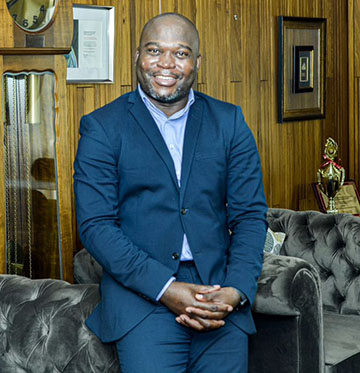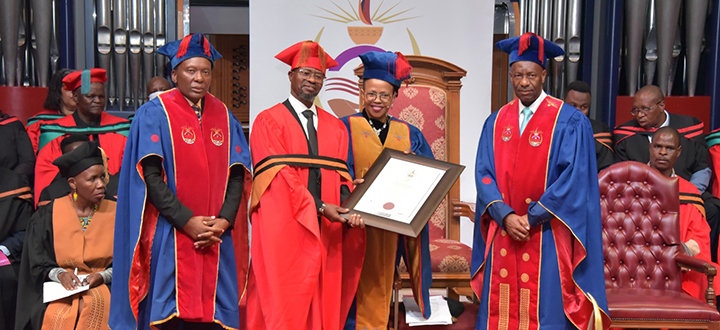News & Media
Unisa gains a visionary leader to drive financial sustainability
“My passion for youth development and empowerment, coupled with a belief in the ability of education to change lives for the better, are what inspired me to want to be part of the Unisa family,” says Khathutshelo (Khathu) Ramukumba, newly appointed Unisa Chief Financial Officer (CFO). He adds: “Unisa is the largest university on the continent, and I believe that its open, distance and e-learning model represents the future of teaching and learning. It was an obvious choice for me.”

Khathutshelo (Khathu) Ramukumba
His vision is to secure the university’s financial sustainability through financial prudence, growing third-stream revenue and reducing the heavy reliance of its revenue base on the fiscus. “I also aim to position finance and supply chain management as a dependable partner of the core business portfolios in the delivery of the university mandate of teaching and learning, research and innovation, and community engagement,” he adds.
Ramukumba explains the role of Unisa’s Finance Department as providing support to the core business of teaching and learning, research and innovation, and community engagement through the implementation of, among others, financial planning, assets and liabilities management (which includes the treasury function), and supply chain management, which is about effective and efficient procurement of goods and services in a fair, objective, transparent and equitable manner that achieves value for money.
“My role is to provide strategic financial and procurement advice to the Vice-Chancellor, Mancom and Council, which facilitates the allocation, efficient and effective deployment and management of the university’s financial resources in the implementation of its mandate and strategy,” he explains. “This includes facilitating and supporting the university’s commercialisation efforts through its various colleges and entities and other third-stream revenue initiatives.”
Furthermore, he has to ensure the development and implementation of a budget that supports the institution’s strategy, must also implement and oversee prudent, efficient and effective financial and asset management processes, and design and implement economical, cost-effective and equitable procurement systems, as well as timeous and quality financial reporting.
Finance is his true calling
The idea that money influences, shapes and determines the socio-economic conditions of societies across the world drove Ramukumba’s interest in the study of finance. On the other hand, he describes himself as a spiritual person who puts God first in everything he does. He says a scripture verse that keeps him going is: “Be strong and courageous, do not be afraid, do not be discouraged for the Lord your God will be with you wherever you go” (Joshua 1: 9).
Ramukumba’s career commenced at the Auditor-General in 2003 where he did his articles towards chartered accountancy as a profession, and later represented it in Audit Steering Committees for clients such as the Public Protector and National Prosecuting Authority. He was admitted as a chartered accountant by the South African Institute of Chartered Accountants in 2010.
Having worked for the Rand Water Group, his career highlights include being involved in two ministerial directive projects on turn-around strategy and support for Botshelo Water in 2009 and Bushbuckridge Water in 2010/2011. He has held high-impact leadership positions such as the CFO, and later the Chief Executive Officer, of the National Youth Development Agency. He also served as the Chairperson of the Audit Committee for the Sekhukhune District Municipality and the Audit Committee for Greater Tubatse Local Municipality.
Maintaining stability without compromising students
“I believe that higher education institutions should embrace and adopt technology as a tool and mode in the delivery of quality teaching and learning,” Ramukumba further states. “This should include re-imagining and ideation on technology as the primary mode of delivery for teaching and learning, research and innovation, as well as community engagement.”
In conclusion Ramukumba says that the implications of COVID-19 and the fact that vaccines are dominated by the West should serve as a challenge to university researchers in the Global South to re-focus their research projects towards advanced solutions to human challenges. “It should be linked with accurate costing,” he says, “which must inform the budgeting and funding initiatives of the business of universities in the current and post-COVID-19 world.”
*By Nancy Legodi, Acting Journalist, Department of Institutional Advancement
Publish date: 2021-02-10 00:00:00.0

 Young Unisa doctoral graduate joins elite Lindau Nobel Laureate group
Young Unisa doctoral graduate joins elite Lindau Nobel Laureate group
 Education MEC addresses Unisa autism seminar
Education MEC addresses Unisa autism seminar
 Seven Unisans nominated for the NSTF-South32 Awards 2023/2024
Seven Unisans nominated for the NSTF-South32 Awards 2023/2024
 Unisa awards posthumous honorary doctorate to literary maven, OK Matsepe
Unisa awards posthumous honorary doctorate to literary maven, OK Matsepe
 From humble beginnings to academic leadership
From humble beginnings to academic leadership